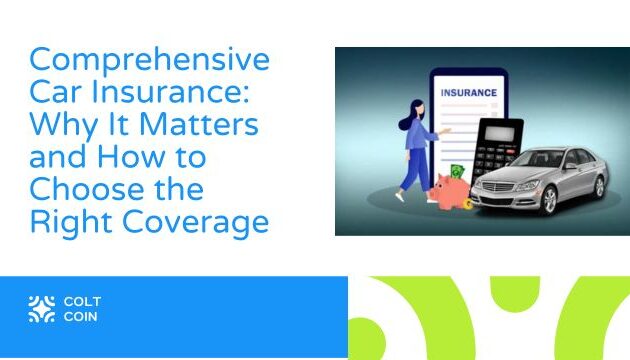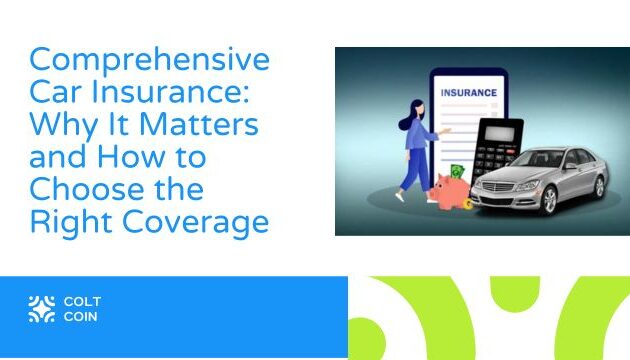Protecting your vehicle goes beyond just basic accident coverage. Comprehensive car insurance offers a safety net against a range of non-collision incidents such as natural disasters, theft, and vandalism. For many vehicle owners, it provides essential protection that brings peace of mind. This guide will explore what comprehensive car insurance covers, how it differs from other types of insurance, and why it may be a wise choice for you.
What Is Comprehensive Car Insurance?

Comprehensive car insurance is designed to cover damages to your vehicle that are not the result of a collision with another vehicle. Unlike liability or collision insurance, which typically address accidents, comprehensive coverage steps in to protect your car against incidents such as theft, vandalism, fire, and extreme weather events.
Key Coverage Areas of Comprehensive Car Insurance
Comprehensive insurance extends beyond traditional policies to cover various scenarios. Here are some common situations it addresses:
- Theft If your vehicle is stolen, comprehensive coverage can help with the replacement or cover damages caused during the theft. This is particularly beneficial in areas with higher crime rates.
- Vandalism Damages caused by vandalism, such as graffiti or broken windows, fall under comprehensive insurance. You can file a claim to cover the repair costs without bearing the entire financial burden yourself.
- Natural Disasters Comprehensive coverage safeguards your vehicle from weather-related damage, including hailstorms, flooding, hurricanes, and tornadoes. Living in regions prone to extreme weather makes this protection vital.
- Fire In cases of fire, whether due to accidents, arson, or wildfires, comprehensive insurance covers damage to your car.
- Animal-Related Incidents Comprehensive coverage helps with repairs if your vehicle collides with an animal or is damaged by wildlife. This is especially relevant in rural areas where animal collisions are more frequent.
- Falling Objects Damage from falling objects, such as a tree branch or debris from a construction site, is covered under comprehensive insurance.
How Comprehensive Car Insurance Differs from Other Coverage Types
Many vehicle owners confuse comprehensive insurance with other forms of coverage. Here is a breakdown to clarify these differences:
- Comprehensive vs. Collision Insurance Comprehensive coverage addresses non-collision incidents, while collision insurance covers damage resulting from a crash with another vehicle or object. For instance, if you hit a tree or another car, collision insurance applies.
- Comprehensive vs. Liability Insurance Liability insurance covers damage you cause to others or their property during an accident. It does not extend to your own vehicle’s repairs. Pairing liability with comprehensive coverage ensures your car is protected while guarding against third-party claims.
- Comprehensive vs. Personal Injury Protection (PIP) Personal Injury Protection covers medical expenses and lost wages for you and your passengers regardless of fault in an accident. Comprehensive insurance focuses solely on your vehicle’s non-collision damages, making PIP important for medical coverage.
Why Consider Comprehensive Car Insurance?
While comprehensive coverage may be optional in some cases, several compelling reasons highlight its value:
- Protection Against Unpredictable Events Comprehensive insurance covers natural disasters, theft, and vandalism, offering peace of mind against unexpected incidents.
- Lender and Lease Requirements Many financing or leasing agreements mandate comprehensive coverage to protect their investment in your vehicle.
- High-Risk Areas If you live in an area with high rates of theft, vandalism, or extreme weather, comprehensive coverage offers critical financial protection.
- Peace of Mind Comprehensive coverage lets you drive with confidence, knowing your vehicle is safeguarded against a wide array of risks.
Factors Influencing the Cost of Comprehensive Car Insurance
The cost of comprehensive insurance varies based on several factors. Understanding these will help you estimate your premiums and choose a suitable policy:
- Vehicle Value High-value cars tend to have higher premiums, as insurers may face larger payout amounts in case of damage or theft.
- Deductible Amount A higher deductible reduces your premium but increases out-of-pocket costs when filing a claim.
- Location Living in areas with higher risks, such as frequent natural disasters or higher crime rates, may lead to increased premiums.
- Driving History Although comprehensive insurance doesn’t cover collisions, a history of claims or traffic incidents can affect your overall premium.
- Coverage Limits Higher coverage limits offer greater protection but may result in higher premiums.
Choosing the Right Comprehensive Car Insurance Policy
Finding the right policy involves careful assessment of your needs and budget. Here are some tips to guide your decision:
- Assess Your Risks Evaluate the likelihood of theft, natural disasters, or vandalism in your area. High-risk areas justify investing in comprehensive coverage.
- Compare Quotes Shop around and compare quotes from multiple insurers to find the best rates and coverage options.
- Look for Discounts Insurers often offer discounts for bundling comprehensive coverage with other policies, such as home or life insurance. Ask about available discounts.
- Understand Your Deductible Opt for a deductible that balances affordability with sufficient coverage in the event of a claim.
- Read the Fine Print Ensure the policy’s terms, coverage limits, and exclusions align with your specific needs.
Conclusion
Comprehensive car insurance provides robust protection against a wide range of non-collision incidents, from theft to natural disasters. By understanding what comprehensive insurance covers and how it differs from other types of auto insurance, you can make an informed decision that suits your needs.
Call to Action
If you’re ready to explore your options, compare comprehensive car insurance quotes from multiple providers today to find the right fit for your budget and needs. Stay protected on the road and beyond.




